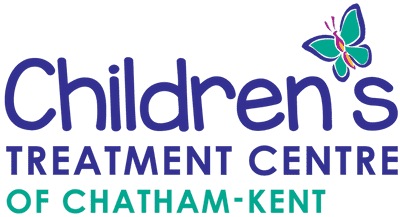Augmentative Communication Services
Our Augmentative Communication Services (ACS) General Level Clinic helps individuals, and their families find ways to communicate. The Ministry of Health’s Assistive Devices Program (ADP) authorizes the Children’s Treatment Centre of Chatham-Kent (CTC-CK) to provide appropriate ACS services to individuals with home-based complex communication needs. Many individuals use their communication devices at school; however, devices cannot be prescribed for school use only.
Who Are We:
The ACS team is made up of Speech Language Pathologists, Occupational Therapists, and Communication Disorders Assistants who have additional, specialized training in Augmentative and Alternative Communication (AAC). AAC is various methods of communication that can be used to help people who have difficulties speaking verbally or writing efficiently.
What We Do:
Our team works with individuals and families to assess communication needs and provide recommendations and/or equipment tailored to meet their unique communication challenges. Any equipment recommendations must meet ADP’s funding criteria, but we provide consultative services for those who do not meet these criteria. Training and consultation regarding ACS devices are provided to individuals, who have been prescribed a device, and their caregivers in all environments (home, school, community).
Eligibility and Referrals
Our Augmentative Communication Service accepts referrals for individuals younger than 21 years of age who are residing in Chatham Kent. The following guidelines must be met for the referral to be considered:
Face to Face Communication:
- Individuals who are nonverbal or who are verbal but not understood.
- Purposefully using 20 plus symbols with core and fringe vocabulary for everyday needs.
- A direct accessor (able to point directly to items).
- Intentionally communicating three or more of the following: they want something, they need help, they don’t want something, they want attention, they are directing an activity, they want more of something, they don’t want to do something and/or they are making choices.
- Understand the need to supplement their current communication for more than simple requests.
- Have a facilitator committed to maintain the system and to support identified communication needs and goals.
Why is using 20 symbols important?
- It indicates the individual is aware their speech is not well understood, and they are willing to use another method to clarify communication breakdowns.
- The individual gains experience using symbols.
- The individual gains an understanding of symbols and that they can be used to communicate.
- It helps with initial vocabulary selection.
- It indicates a gap between what the individual understands and what they can express.
- It clarifies the individual’s desire to communicate.
Writing:
- Individuals who have a physical disability that effects their ability to write or type.
- Have literacy skills to write and have home writing needs.
- Not able to use a paper or pencil and are not able to use a standard keyboard or mouse.
How to Refer:
Please complete the Augmentative Communication Service Referral Questionnaire together with the individual’s community SLP or OT. Return the completed form to CTC-CK by mail or fax: 519-354-7355.
If the individual is not yet displaying the listed eligibility criteria or you are unsure if the referral is appropriate, speak to the individual’s primary SLP or OT about AAC support or request an ACS Consultation by completing the Augmentative Communication Service Consultation Request.

